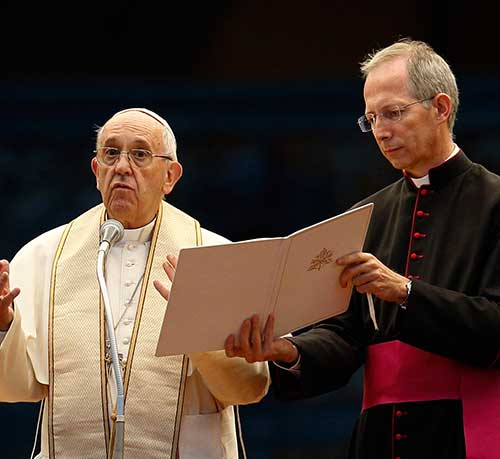COLLEEN JURKIEWICZ
CATHOLIC HERALD STAFF
New universal norms for the handling of clergy sexual abuse cases were established earlier this month by Pope Francis when he issued a motu proprio decree entitled Vos estis lux mundi (You are the light of the world) on May 9.
But there aren’t any significant changes in store for how the Archdiocese of Milwaukee responds to allegations of clergy sexual abuse — the norms instituted by the motu proprio closely mirrored the

so-called “Dallas Charter” (“Essential Norms” and “The Charter of the Protection of Children and Young People”) adopted by the US Bishops in 2002 and followed by the archdiocese since that time.
The procedures outlined in Vos estis lux mundi, which are in effect for an experimental period of three years beginning June 1, extend beyond minors to include the clerical abuse of someone “by violence or threat or through abuse of authority” and does include an entire section regarding the handling of allegations against bishops. It also includes within its scope of application the “production, exhibition, possession or distribution, including by electronic means, of child pornography” and “actions or omissions intended to interfere with or avoid civil investigations or canonical investigations.”
Some of the changes called for by the motu proprio include:
— The establishment, within one year, of “stable and easily accessible systems for submission of reports;”
— The protection of persons submitting the report (“An obligation to keep silent may not be imposed on any person with regard to the contents of his or her report.”);
— Ecclesiastical authorities shall ensure that victims and their families are given spiritual assistance and offered medical assistance, including therapy;
— Allegations made against a bishop must be transmitted both to the Holy See and to the “Metropolitan of the Ecclesiastical Province where the person reported is domiciled” (Archbishop Jerome E. Listecki is the Metropolitan of the Ecclesiastical Province of Milwaukee, which includes the entire state of Wisconsin and its dioceses); and
— Allegations made against a Metropolitan would be transmitted to the Holy See and to the senior suffragan bishop by promotion.
Archbishop Listecki, in cooperation with the other bishops of Wisconsin, is in the process of implementing a clearly defined process whereby reports can be made to report misconduct by bishops, “including instances where bishops are not honoring their commitments in responding to clergy sexual abuse or living up to safe environment standards,” according to an email sent by Dr. Barbara Anne Cusack, Chancellor of the Archdiocese of Milwaukee, to parish directors and staff members throughout the archdiocese.
Cusack also wrote that Archbishop Listecki will soon appoint a Fitness for Ministry Oversight Board “that will initiate a process for the review of complaints about serious breaches of the Code of Ethical Standards.”
The motu proprio, which follows February’s Meeting on the Protection of Minors in the Church at the Vatican, will mean significant changes to some dioceses in the Catholic Church that exist in places where there are not already established reporting systems or effective criminal justice systems, said Suzanne Nickolai, Safe Environment program manager for the Archdiocese of Milwaukee.
The Archdiocese of Milwaukee also makes use of a Community Advisory Board, a body that meets quarterly to provide Archbishop Listecki with input on policies and procedures relating to sexual abuse. Members include representatives of the Catholic laity, law enforcement, victims/survivors of sexual abuse and social workers.
“There won’t be much that changes for us,” said Nickolai. “In an area where things like this aren’t already being implemented — that’s a whole different story; a lot of things might be changing. But it’s always nice to get instructions from the Vatican that are already being done.”
